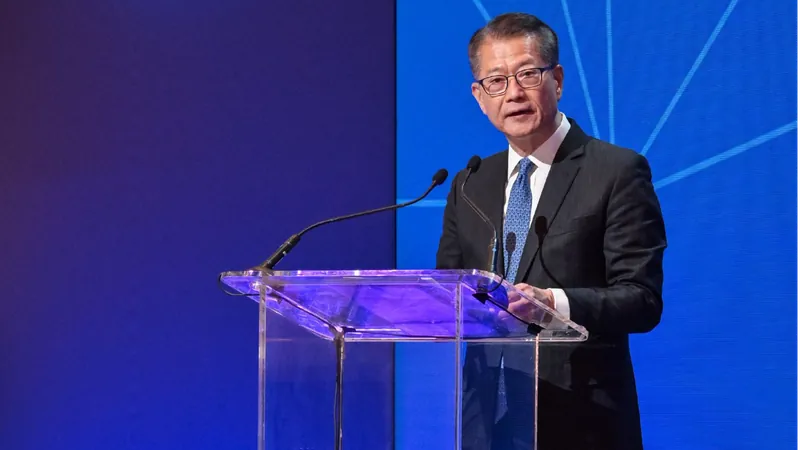
Hong Kong: The Emerging Catalyst for Global Economic Collaboration
2025-03-24
Author: Kai
Hong Kong's Role in Global Economic Cooperation
In a significant gathering at the Milken Institute Global Investors’ Symposium held in Hong Kong, Financial Secretary Paul Chan Mo-po emphasized the city's pivotal role as a catalyst for global economic cooperation. With over 400 senior executives from various sectors in attendance, the discussions reflected Hong Kong's strategic position in today’s interconnected financial landscape.
“Holding its status as one of the world’s most open, dynamic, and globally connected financial centers, Hong Kong continues to act as a vital gateway to the Chinese mainland and the broader Asia region,” Chan asserted. He highlighted the city’s commitment to enhancing its financial services and technological sectors to attract more global investors.
Global Financial Centres Index Ranking
A recent report from the Global Financial Centres Index, published in March, reaffirmed Hong Kong's strong position, ranking it third in the world and first in the Asia-Pacific region. This ranking underscores the city’s enduring appeal as a destination for international investment and financial activities.
Increased Foreign Investment Activity
Oliver Weisberg, CEO of Blue Pool Capital—responsible for managing assets for notable investors like Alibaba Group’s Joe Tsai—echoed Chan’s sentiments, noting a spike in foreign investment activity. He mentioned that the influx of private equity, hedge funds, and long-only managers visiting Hong Kong is critical for the city to reclaim its preeminent status on the global stage.
Diverse Funding Opportunities
Chan elaborated on the diverse funding opportunities available in Hong Kong, ranging from angel investing to private equity and IPOs. “We are constantly reviewing our listing regime and expanding our product offerings to attract top-tier issuers and fresh capital,” Chan explained.
Expanding Market Ties
As China actively pursues the momentum of its external trade, Chan stated that Hong Kong will not only strengthen its ties with traditional markets like Europe and the United States but will also vigorously seek to penetrate new markets. He emphasized the importance of collaborative efforts with mainland provinces and cities to collectively attract foreign investments.
Collaboration Beyond Finance
Moreover, Chan pointed out that the collaboration between Hong Kong and other emerging markets goes beyond finance. He expressed optimism regarding Hong Kong’s aspirations in innovation and technology, particularly through its growing partnerships within the Guangzhou-Hong Kong-Macao Greater Bay Area. This collaboration is seen as instrumental in driving technological advancement and economic integration.
Integration into the Greater Bay Area
Goodwin Gaw, chairman of Gaw Capital Partners and a key participant in the symposium, remarked on the significance of integrating into the Greater Bay Area. He referred to the increased labor mobility among finance, tech, and manufacturing sectors as “blood swapping,” predicting that this synergy will evolve the region into a cohesive economic powerhouse.
Conclusion
As Hong Kong continues to navigate its economic future amidst shifting global dynamics, the city not only aims to solidify its financial prominence but also to foster innovation and enhance its global economic partnerships. The Milken Symposium serves as a critical platform for shaping these ambitious strategies, positioning Hong Kong at the forefront of international economic cooperation.

 Brasil (PT)
Brasil (PT)
 Canada (EN)
Canada (EN)
 Chile (ES)
Chile (ES)
 Česko (CS)
Česko (CS)
 대한민국 (KO)
대한민국 (KO)
 España (ES)
España (ES)
 France (FR)
France (FR)
 Hong Kong (EN)
Hong Kong (EN)
 Italia (IT)
Italia (IT)
 日本 (JA)
日本 (JA)
 Magyarország (HU)
Magyarország (HU)
 Norge (NO)
Norge (NO)
 Polska (PL)
Polska (PL)
 Schweiz (DE)
Schweiz (DE)
 Singapore (EN)
Singapore (EN)
 Sverige (SV)
Sverige (SV)
 Suomi (FI)
Suomi (FI)
 Türkiye (TR)
Türkiye (TR)
 الإمارات العربية المتحدة (AR)
الإمارات العربية المتحدة (AR)